Scratch Sprint Magnum Original Design / Scratch Built
Scratch - Sprint Magnum {Scratch}
Contributed by Tim Burger
| Manufacturer: | Scratch |

(Contributed - by Tim Burger)
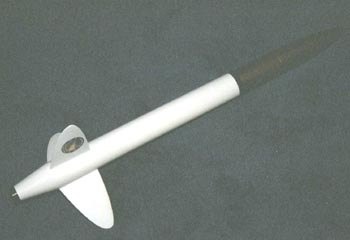 Brief:
Brief:
Sprint Magnum - a scratch made upscale of a popular Estes kit of the '70s.
Parts required:
1 - Balsa Nosecone, Balsa Machining Service
2.6" x 8 1/16" ogive with spherical tip; BNC50X in 2.6 inch size
1 - 2.6" x 25 1/2" Body Tube, Totally Tubular (cut from stock)
1 - 29mm x 18 5/8" Motor Tube, Totally Tubular (cut from stock)
1 - 29mm x 6" Nose Tube, Totally Tubular (cut from stock)
1 - BT-60 x 5" Baffle Tube, Estes or Totally Tubular
4 - 1/8" ply rings, 29mm to 2.6", Balsa Machining Service
2 - 1/2" long x 1/4" dia Launch Lugs, Apogee Components (cut from
3" length)
1 - 6' Kevlar (tm) string, 300#, Apogee Components, Into the Wind
1 - 1 1/8" x 3" hardwood dowel, local hardware store (cut from stock)
1 - 1 1/8" x 1" hardwood dowel
1 - 30" nylon parachute, Giant Leap Rocketry
1 - Slimline Retainer, Giant Leap Rocketry
1 - #10 x 1 1/2" wood screw
12 - #10 x 1" fender washers for ballast
2 - #10 x 1" screw eye (wood)
1 - 36" x 3/8" elastic strap
1 - 4" x 36" x 3/16" basswood
1 - 2.4" long x 3/8" diameter hardwood dowel
Cardstock for boattail
Parts for Motor Adapter:
1 - BT-50 3 3/8" long
1 - 29mm mount tube 3 1/2" long
1 - 29mm mount ring 3/8 inches long (cut from motor tube stock)
1 - CR2050 (optional)
1 - 1 1/8" fender washer
Specs:
Diameter: 2.6"
Length: 36.9"
Weight: 14 to 22 oz (weight adjusted for balance)
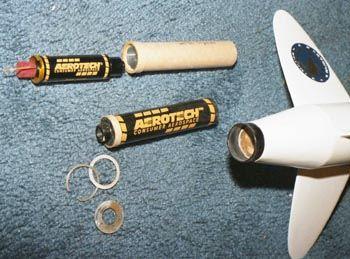 Motors:
Motors:
24mm (requires adapter)
E28-4 RMS 670 feet
F39-6 RMS 987
29mm
E23-5 RMS 575 feet...
USE LONG LAUNCH RAIL
F40-7 RMS 1697
F50-9 SU 1833
F52-8 RMS 1656
G33-7 RMS 2075
G40-10 2534
G64-10 RMS 2552
G80-10 SU 2539
H70-10 3990
H128-10 RMS 3082
Estimated altitude assumes 16oz flying weight, and is based on Apogee
Component's Rocksim 5 software.
Overview:
This rocket is the first of a couple of upscale projects that I have in mind. It is the first large rocket that I've made from scratch, and my first flagrant upscale of an old Estes Classic. I was always impressed with the way the original Sprint left the launch rod and was gone in a blink. My version features a 2.6-inch airframe, a 29mm motor mount, through the wall fin construction, and an ejection baffle. The Slimline motor retainer completes the picture.
Construction:
As with most projects like this, I start by cutting the tubes to length. The 2.6-inch airframe tube starts out 34 inches long and a 25.5-inch long section is cut from this stock. The 18 5/8-inch motor mount is cut from stock as is the six inch nose cone liner tube. Since you're cutting tubes, go ahead and cut a five inch length of Estes BT-60 from a piece of stock.
Next, cut the basswood board into three equal lengths. Stack the three pieces and tack glue the slabs together with a single small dot of slow CA between layers. The CA will hold the three fins together while they are being cut out and sanded to a uniform size. Draw the outline of the fins on the top of the stack and cut out the basic shape using a band or scroll saw. Use a disc sander to set the final shape. The three parts can now be popped apart. The disc sander should now be employed to rough in an airfoil into each one. Use a sanding block with 220 grit to finish and perfect the airfoil shape, and then switch to a finer grit to cut out the scratches.
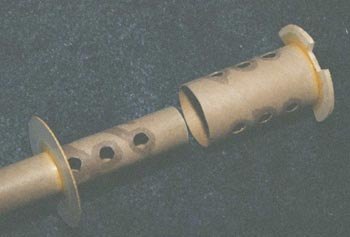 Now make the ejection baffle by marking the motor
mount tube with three lines running the length of the tube equally spaced
around the tube. Do the same with the BT-60. Now cut a group of four holes in
the motor mount tube along each of the three lines starting at 1 inch from the
top of the tube spaced 7/8" inches apart (12 holes total). Do this to the
BT-60 tube as well but start the holes at the 1/2-inch mark so that the two
groups of holes will be staggered when the baffle is assembled. The forward
motor ring is now glued on at 7 1/8" from the aft end. While that is
drying, the BT-60 can be centered on and glued to one of the remaining rings.
When the glue is dry cut three equally sized and spaced tabs from the outside
edge of the ring. The tabs remaining should be centered over the holes. Glue
the one inch piece of dowel into the top of the motor tube flush with the end.
Glue this in well; the recovery system will be tugging on this at ejection.
Place a centering ring on the fore end of the motor tube but do not glue yet.
Now glue the BT-60/ring to the top of the mount tube flush with the end, with
the motor tube in the BT-60 and the holes in the two tubes aligned such that
the inside holes are centered between the outside holes. The lower ring should
now be glued firmly to the motor tube and to the bottom of the BT-60. (All of
the holes in the motor tube should be between the two disks.) When finished,
you should be able to blow through the motor mount, with the air passing out
the holes in the side of the BT-60. When installed in the airframe, the air
will pass up through the slots in the top ring at ejection. Allow this assembly
to dry.
Now make the ejection baffle by marking the motor
mount tube with three lines running the length of the tube equally spaced
around the tube. Do the same with the BT-60. Now cut a group of four holes in
the motor mount tube along each of the three lines starting at 1 inch from the
top of the tube spaced 7/8" inches apart (12 holes total). Do this to the
BT-60 tube as well but start the holes at the 1/2-inch mark so that the two
groups of holes will be staggered when the baffle is assembled. The forward
motor ring is now glued on at 7 1/8" from the aft end. While that is
drying, the BT-60 can be centered on and glued to one of the remaining rings.
When the glue is dry cut three equally sized and spaced tabs from the outside
edge of the ring. The tabs remaining should be centered over the holes. Glue
the one inch piece of dowel into the top of the motor tube flush with the end.
Glue this in well; the recovery system will be tugging on this at ejection.
Place a centering ring on the fore end of the motor tube but do not glue yet.
Now glue the BT-60/ring to the top of the mount tube flush with the end, with
the motor tube in the BT-60 and the holes in the two tubes aligned such that
the inside holes are centered between the outside holes. The lower ring should
now be glued firmly to the motor tube and to the bottom of the BT-60. (All of
the holes in the motor tube should be between the two disks.) When finished,
you should be able to blow through the motor mount, with the air passing out
the holes in the side of the BT-60. When installed in the airframe, the air
will pass up through the slots in the top ring at ejection. Allow this assembly
to dry.
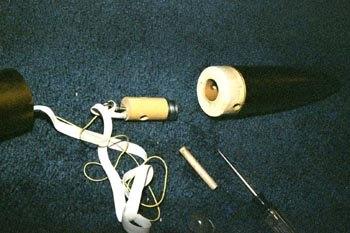 Test fit the fins to the motor tube. Locate the last
ring on the motor tube against the back of the fin tabs. Don't glue it to the
tube just yet. This should be about 3 and 3/8 inches from the aft end of the
tube. Trim and sand the fins until they reach to the tube with the notch in the
back of the fins just touching the top of the ring, but with enough space
between the front notches and the ring for the thickness of the body tube to
fit. Mark the body tube for the fins slots by making three marks equally spaced
around the bottom of the tube and use a doorjamb or marking guide to draw lines
along the tube. Make a parallel set of lines 3/16-inch over from the first set.
Mark a line around the tube at 3 7/8 inches from the end. Slide the motor tube
assembly into the airframe tube to support the body while you cut out the slots
for the fins. Cut the slots using a good sharp knife - put a new blade in your
X-acto knife. The top of the slots should be even with the aft end of the
forward motor ring when the after ring is inside the tube 1/8 inch and located
in the correct spot on the motor tube. Tack glue the fins to the motor tube
with the motor mount properly located in the airframe, being careful that you
don't inadvertently glue the assembly together. Naturally, the fins should be
in line with the centerline of the rocket (automatic if the slots are straight)
and stand straight out from the airframe. Remove the assembly from the airframe
and run fillets of glue around all fin joints. Take it easy on the glue here;
excess weight in the aft of the rocket will really cause trouble later. This
model has the potential to be very tail heavy. Be careful not to get glue on
the aft fin tabs or on the motor tube aft of the tabs which will interfere with
aft ring when it is installed.
Test fit the fins to the motor tube. Locate the last
ring on the motor tube against the back of the fin tabs. Don't glue it to the
tube just yet. This should be about 3 and 3/8 inches from the aft end of the
tube. Trim and sand the fins until they reach to the tube with the notch in the
back of the fins just touching the top of the ring, but with enough space
between the front notches and the ring for the thickness of the body tube to
fit. Mark the body tube for the fins slots by making three marks equally spaced
around the bottom of the tube and use a doorjamb or marking guide to draw lines
along the tube. Make a parallel set of lines 3/16-inch over from the first set.
Mark a line around the tube at 3 7/8 inches from the end. Slide the motor tube
assembly into the airframe tube to support the body while you cut out the slots
for the fins. Cut the slots using a good sharp knife - put a new blade in your
X-acto knife. The top of the slots should be even with the aft end of the
forward motor ring when the after ring is inside the tube 1/8 inch and located
in the correct spot on the motor tube. Tack glue the fins to the motor tube
with the motor mount properly located in the airframe, being careful that you
don't inadvertently glue the assembly together. Naturally, the fins should be
in line with the centerline of the rocket (automatic if the slots are straight)
and stand straight out from the airframe. Remove the assembly from the airframe
and run fillets of glue around all fin joints. Take it easy on the glue here;
excess weight in the aft of the rocket will really cause trouble later. This
model has the potential to be very tail heavy. Be careful not to get glue on
the aft fin tabs or on the motor tube aft of the tabs which will interfere with
aft ring when it is installed.
Mark one last parallel line on the body tube spaced evenly between two of the fin slots for the launch lugs.
Drill a small pilot hole in the center of the top ring and into the hardwood plug. Screw one of the screw eyes into this hole and tie one end of the Kevlar string and elastic to it. Coil the whole thing up and tape it loosely to the top of the baffle to keep it out of the way while gluing the assembly into the airframe.
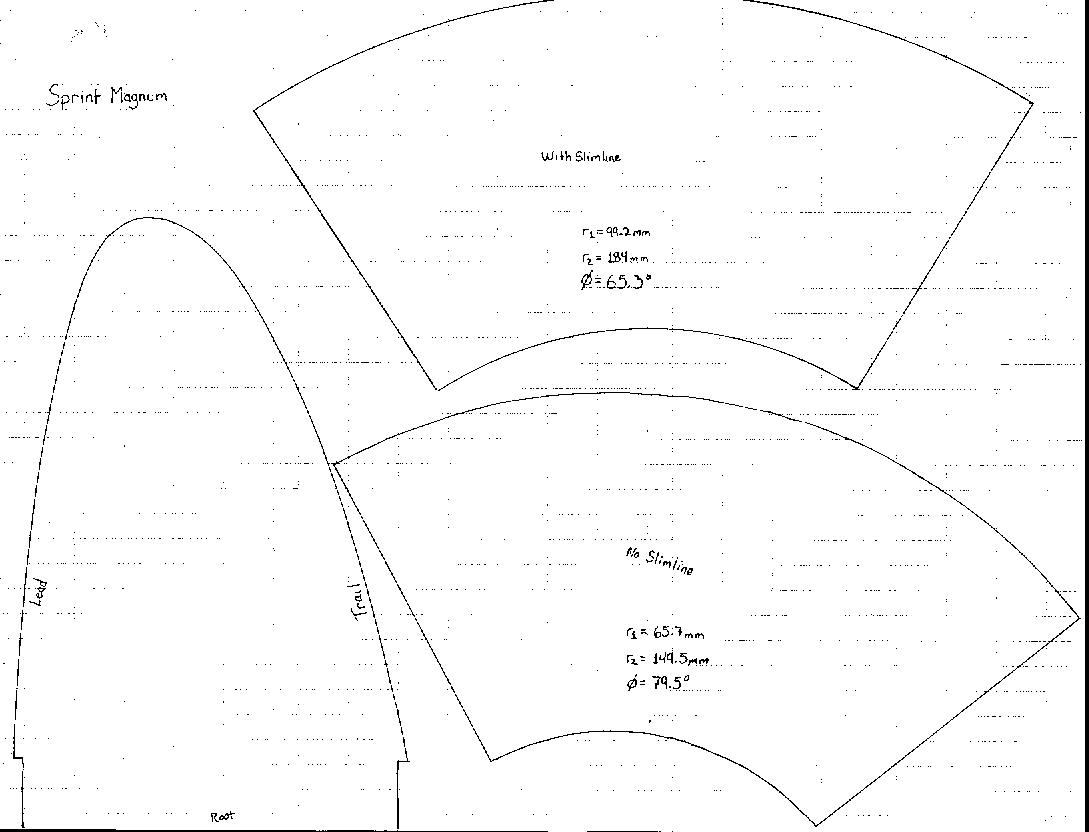 (Click for full size) |
Now glue the fin/motor/baffle assembly into the rocket airframe. The after centering ring should be inside the rocket about an eighth of an inch when it is against the back of the fin tabs when the fins are in place. Create glue fillets around the fins inside the body tube where they meet. Also add fillets to the back of the centering ring where it meets the tube. Now glue the final ring to the back of the fin tabs and motor tube. Use a long stick to apply glue to the top ring ensuring that it is firmly glued to the airframe tube. This is important because the recovery system yanks at this joint at ejection. Cut a 3/16-inch ring from the left over 2.6 inch tube stock. Cut a small section out of the ring and fit it into the aft end of the rocket; it should stick out of the aft end of the rocket a small amount when the inside edge of the ring is against the aft ring. The two ends should just meet - trim a little off the ends until it just fits. Run a fillet of glue at the motor tube/ring joint and airframe/ring edge of the after ring, and at the same time glue in the short ring just made. This creates a lip for the boattail. Apply fillets to the fin roots on the outside of the airframe. Again, take it easy on the glue! The fillets should be smooth and strong but not excessive. During the fillet process you should glue the launch lugs on locating one near the aft end of the body tube and the other at about 18 inches up from the aft end of the airframe tube.
Use JB Weld to glue the Slimline retainer to the end of the motor tube being careful to follow the Slimline instructions. Use care to get the spacing correct for your motor hardware. The 29/40-120 aft closure is a different size than the Easy Access 29mm hardware aft closure. If you plan to use both, size the gap for the Easy Access hardware and then use a spacer cut from scrap motor tube to adapt the hobby motor hardware.
While the fin fillets are drying, cut two copies of the boattail from card stock. One should be about 1/16-inch longer than the other. Use the edge of a table or metal rule to produce a curl in the stock. Continue to curl the card by rolling it on itself until it is so curly that the edges meet naturally. Cut a strip of card the length of one side of the short shroud from scrap. Glue it to one of the edges of the short shroud, it should hang off half way since it will be used to join the two edges together. When dry, fit the shorter shroud to the aft end of the rocket. It should fit snuggly (but not tightly) to the Slimline retainer, and just match the inside of the airframe tube riding on the lip created by the ring. Adjust and trim the shroud as needed, then glue the tab to the other side of the cone. Use tape to hold these two sides together - try and get the cone as round as possible. When dry test fit the remaining cone to the top of the first one. It should match at both ends. Trim and adjust it until it does then glue it over the smaller one with the seam on the opposite side as the other's seam. Take care to get the two edges butted together and to get it well centered over the smaller one. I used yellow glue for this, but CA would work well, as would a very thin layer of epoxy. At this point, you may glue the two parts to the rocket using epoxy or JB Weld. Use the rocket and tape to hold the parts as round as possible as the glue cures.
Now for the nose cone. If you've been careful with the glue, your rocket will weigh in at about 8oz (sans the cone). With the cone it should be about 10, you are about to add another two and the ability to adjust the nose weight. Drill the inside of the cone out carefully (use a press!) so that the 29mm tube will slide easily into the hole. The hole should be 6 or 7 inches deep. Take care to drill the hole in the center and don't go too deep. Glue the six-inch long 29mm tube into the hole so that it is flush with the shoulder end. Slide the 1 1/8-inch hardwood dowel into the tube until it is flush with the end. Hold it there with tape and drill a 3/8-inch hole through the shoulder of the cone, through the 29mm tube, through the hardwood dowel, and out through the other side. The hole should be just below shoulder ridge. Remove the dowel and soak the inside of the balsa holes with thin CA and allow it to fully cure. The 3/8-inch dowel should now pass through the shoulder into the hardwood dowel and hold it there. Be careful to allow the CA to dry before you test fit! Sand the dowel until it will slide through - it should be snug but not overly tight. Cut the dowel to length - it should just fit below the shoulder allowing the nose to be fit into the airframe. Drill a small pilot hole into both ends of the 1 1/8-inch dowel. Screw the screw eye into the aft end, and the wood screw into the other. Tie the Kevlar string and elastic to the screw eye. Assemble the cone and test fit it into the airframe. This system is arranged this way to allow enough nose weight for G and H impulse motors to be added, and yet allow a way to lighten the rocket for E impulse 24 mm motors using an adapter. Add washers to the screw for large motors (29mm), and remove washers for smaller (24mm) motors. The total weight with a plastic 'chute and an Aerotech RMS E28-4 should be about 14 oz. The total weight with a 30" nylon 'chute, Aerotech G64-10, and enough nose weight to get the correct balance is just over 22 oz. Mark the rocket at 24 1/2" inches from the tip of the nose cone. The rocket should balance at or in front of this mark with a motor loaded. Add washers to the nose until it does. Check and adjust the balance before every flight! Add a step for balance to your checklist.
Finally, make a 24mm adapter. Glue the thrust ring flush with one end of the 24mm tube (optional - I use this adapter in other rockets with Estes single use motors using a spacer with 70mm long motors). Draw two parallel lines the length of the 29mm tube spaced about an 1/8-inch apart. Cut the strip between the two lines out of the tube. Glue the 29mm tube around the 24mm tube so that the motor block end of the 24mm tube is flush with the end of the 29mm tube. The 1/8-inch inset is to allow for the thrust ring of the 24mm reload hardware. Trim off one edge of the 29mm tube as needed - it's OK if the two edges don't meet. Test fit the 3/8" band and the washer together in the mount - you should be able to install the retainer clip easily, but there should be little or no slop in the parts. You may need to adjust the size of the 3/8" band to fit your motor retainer depending on how much space you left between the retainer and the motor tube. Trim or cut a larger one as needed. Glue the 3/8" 29mm band flush with end of the assembly opposite the motor block. Drill out the fender washer so that the center hole is larger than any given 24mm RMS motor nozzle - 5/8" should be about right. Use a drill press and a press clamp! To use the adapter, slide the motor into it in the normal fashion, then slide the whole thing, ejection/block end first, into the mount. Place the washer over the top of the assembly, and insert the spring keeper into the Slimline retainer.
This is a somewhat challenging rocket to build because of the boattail. It is also a challenge avoiding overgluing thus adding unnecessary weight. The outcome is a sleek looking rocket.
Rating: 5/5
Finishing:
Sand the basswood fins lightly with 220 grit paper, and a little more with 400 grit paper. The balsa cone should also be lightly sanded with 400 grit paper. Now seal both cone and fins with three coats of Aerogloss sanding sealer with a light sanding in between. Fill the spiral with Elmer's Fill 'n' Finish wood filler and sand it smooth. You may need to do this twice. Carefully wipe the rocket clean of dust and spray it with a layer of white primer. The primer coat will allow you to be able to see the flaws in the fin fillets and spirals. Work out these flaws and then sand until the primer is very thin. Wipe it clean again and hit it with another layer of primer. This layer should be sanded lightly until very smooth with 400 grit paper and wiped clean one last time. Now two coats of satin or flat white should be sprayed. Wait the correct amount of time as outlined in the instructions of the paint you are using then mask the lower section of the rocket. Spray the top section with a yellow or metallic paint. Removed the mask and add navy blue trim Monokote to create the stripe and highlights.
This isn't an overly challenging finish. The only tricky part was the circle detail cut from Monokote Trimcoat.
Rating: 4/5
Flying:
So far I've only flown this rocket one time. At the first high power launch sponsored by my NAR section. The overcast was low all day so we didn't get a chance to fly high until very late in the afternoon preventing me from flying it on large motors. The motor I used was a 24mm E28-4 using an adapter. The rocket left the rail and went arrow straight with no spin. It ejected just at apogee and opened a 24" nylon 'chute. It landed a few yards beyond the pads, but it hit a little hard - no damage. A 30 inch 'chute would be better. Dual deployment options would be a good idea, but that's another project. Arrow straight and a lot higher than I thought it would go on a small motor.
Rating: 5/5
Overall
This is a great rocket. I'm really pleased with how it came out and how well it flies. I'm looking forward to putting some serious motors in it in the near future.
Rating: 5/5
Sponsored Ads
 |
 |











